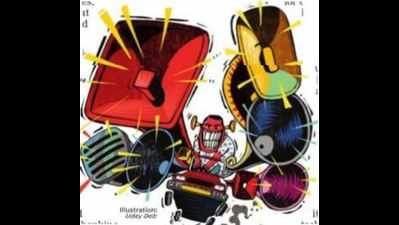- News
- City News
- delhi News
- Study signals gap in traffic enforcement
Trending
This story is from August 15, 2016
Study signals gap in traffic enforcement
So you thought Indian motorists honk because they don't know that it is illegal to do so or be cause they don't realize how up setting it can be for others? Well, it appears that neither is truemost drivers honk because they seem to think they can get away with it.

So you thought Indian motorists honk because they don't know that it is illegal to do so or be cause they don't realize how up setting it can be for others? Well, it appears that neither is truemost drivers honk because they seem to think they can get away with it.
An eight-city survey commissioned by The Times of India and done by a leading market research agency, IPSOS, which involved interviews with men and women from the highest socio-economic strata, reveals high levels of awareness in Mumbai and other cities about noise pollution rules, especially those that prohibit honking and mandate that sound levels be kept low in residential and institutionalzones.
Over 70% of respondents across India said they were aware that they can be fined for blowing the horn. In every city, barring Hyderabad and Lucknow, more than 80% of drivers were aware that there are designated silence zones where honking is prohibited. Nearly 90% of respondents also knew about the impact noise pollution can have on hearing and on blood pressure and stress levels in the body .
Yet, they admitted, they honked; quite frequently at that. Kolkata, Chennai and Delhi's residents were the most forthcoming--at least 30% of drivers in these cities confessed to honking more than 10 times in a day! (The fact that traffic police in most cities do little to discourage honking is quite apparent).
Finally , only a small section of motorists from the higher income brackets believe that fines will discourage noise-makers; the overwhelming majority is of the view that better “road conditions“ and improved pedestrian facilities are needed if the menace of honking has to end. In other words, they expect pedestrians and traffic to get out of their way rather than take their own finger off the horn.
Expressing concern at the findings, a sen ior cardiologist at Apollo Hospitals, Dr Nikhil Parchure, said, “It is quite clear that changing behaviour on Indian streets will require provid ing a deterrent against honking. If the rule of law is enforced and noise-makers fined, there will be better compli ance.“ Referring to the impact of noise on public health, Dr Par chure said author ities could deploy technology inside ve hicles to monitor car or bike owners who use the horn less and give them concessions in taxes. “In most developed countries, change in behaviour is brought about through a carrot and stick approach.“
An eight-city survey commissioned by The Times of India and done by a leading market research agency, IPSOS, which involved interviews with men and women from the highest socio-economic strata, reveals high levels of awareness in Mumbai and other cities about noise pollution rules, especially those that prohibit honking and mandate that sound levels be kept low in residential and institutionalzones.
Over 70% of respondents across India said they were aware that they can be fined for blowing the horn. In every city, barring Hyderabad and Lucknow, more than 80% of drivers were aware that there are designated silence zones where honking is prohibited. Nearly 90% of respondents also knew about the impact noise pollution can have on hearing and on blood pressure and stress levels in the body .
Yet, they admitted, they honked; quite frequently at that. Kolkata, Chennai and Delhi's residents were the most forthcoming--at least 30% of drivers in these cities confessed to honking more than 10 times in a day! (The fact that traffic police in most cities do little to discourage honking is quite apparent).
Interestingly, when asked which section of motorists made the maximum noise, most SEC A respondents said it was the two-wheeler rid ers, autorickshaw drivers and truckers. According to them, private cars--regardless of whether small, midsize or luxury--barely made any noise. However, that perception was at odds with their own admission that they honked several times a day .
Finally , only a small section of motorists from the higher income brackets believe that fines will discourage noise-makers; the overwhelming majority is of the view that better “road conditions“ and improved pedestrian facilities are needed if the menace of honking has to end. In other words, they expect pedestrians and traffic to get out of their way rather than take their own finger off the horn.
Expressing concern at the findings, a sen ior cardiologist at Apollo Hospitals, Dr Nikhil Parchure, said, “It is quite clear that changing behaviour on Indian streets will require provid ing a deterrent against honking. If the rule of law is enforced and noise-makers fined, there will be better compli ance.“ Referring to the impact of noise on public health, Dr Par chure said author ities could deploy technology inside ve hicles to monitor car or bike owners who use the horn less and give them concessions in taxes. “In most developed countries, change in behaviour is brought about through a carrot and stick approach.“
End of Article
FOLLOW US ON SOCIAL MEDIA










